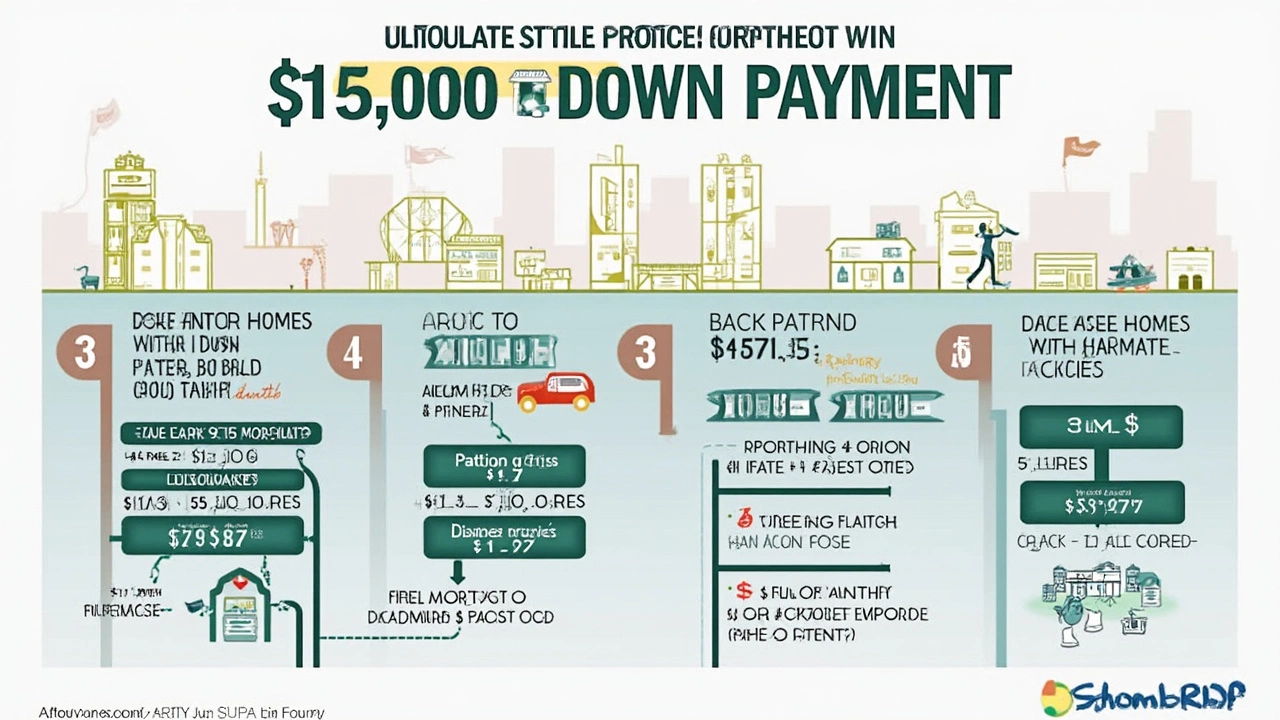First‑Time Home Buyer Tips You Can Use Today
If this is your first go at buying a house, the process can feel like a maze. You’ll see terms like "mortgage," "deposit," and "LTV" everywhere and wonder what they actually mean. The good news? You don’t need a finance degree to get the keys. Below are the core things you should know before you start looking at listings.
Down Payments Explained
The down payment is the cash you put down up front. Most lenders ask for 5‑20% of the purchase price. A 5% deposit on a £200,000 home is only £10,000, but the lower you go, the higher your monthly mortgage payments will be. If you can afford a 10% or 15% deposit, you’ll pay less interest over the life of the loan and may qualify for better rates.
Saving for a deposit doesn’t have to be a grind. Set up an automatic transfer from your checking account to a high‑yield savings account each payday. Even £150 a month adds up to £1,800 a year, which can cover a chunk of a 5% deposit after a few years. Look for local schemes that add a bonus to your savings – many councils and housing charities offer matching funds for first‑time buyers.
Smart Mortgage Choices
Mortgage options are more than just “fixed” or “variable.” A fixed‑rate mortgage locks your interest for a set period (usually 2, 5 or 10 years). It’s great if you like predictability. A variable or tracker mortgage follows the Bank of England base rate, so payments can go up or down. If you think rates will stay low, a variable deal might save you a few pounds each month.
Before you sign anything, ask the lender about fees. Some loans have arrangement fees, early‑repayment charges, or higher rates for low‑deposit borrowers. Use a mortgage calculator to compare the total cost over 25 years, not just the monthly payment. A slightly higher rate with lower fees can end up cheaper in the long run.
Don’t forget government‑backed schemes. The Help to Buy equity loan, for example, can cover up to 20% of a home’s price, letting you put down just 5% of the purchase price. You’ll still need a mortgage for the remaining 75%, but the loan is interest‑free for the first five years.
Now that you understand the basics, here are three quick actions to get moving:
- Check your credit score. A score above 700 usually unlocks better mortgage rates.
- Get a mortgage agreement in principle. It shows sellers you’re serious and gives you a realistic price range.
- Visit at least three properties before deciding. Even if you love the first one, seeing alternatives helps you spot deal‑breakers.
Buying your first home is a big step, but it’s also a chance to set good financial habits for life. Keep your budget realistic, ask plenty of questions, and use the resources on this site to stay informed. With the right plan, you’ll move from renter to homeowner without the usual headaches.

What Credit Score Do You Need to Buy a $300k House?
Thinking about buying your first home for around $300,000? Your credit score can make or break the deal. This article breaks down the minimum numbers you need for different types of loans, digs into what lenders really look for beyond just your score, and shares tips for boosting your chances. Get smart, clear info that actually helps you buy your dream home instead of just adding to the confusion.

Do You Have to Put 10% Down on a House?
Wondering if the 10% down payment rule is set in stone? This article breaks down what down payments really mean for first-time home buyers and explores all your options. We'll cover when 10% matters, how you can go lower—or higher—and share real tips to save money and lower your risk. Don't let old rules hold you back from getting the keys to your first home.

Best Banks for First Time Home Buyer Programs: What You Need to Know
Thinking about buying your first house? Picking the right bank can make a world of difference. This guide breaks down which banks offer the most helpful first-time home buyer programs, what perks you can actually use, and what traps to avoid. You'll find tips to get better rates, snag lower down payments, and survive the mortgage process without sweating bullets. Get ready to shop smart for your first home loan.

What Qualifies as a First Time Home Buyer in Ohio? Clear Rules & Tips
Are you wondering if you count as a first time home buyer in Ohio? This article breaks down the official guidelines and shows what really counts—even if you’ve owned property before. You’ll find out about exceptions, what programs are available, and how it all affects your buying journey. Easy explanations, real-life tips, and no confusing jargon. Understand your status so you don’t miss out on benefits you might be eligible for.

Can I Afford a House on 40k a Year?
Wondering if you can afford a house on a 40k salary? It's a tough question, but not impossible! With the right strategies, saving techniques, and an awareness of affordable markets, you can still make your dream of homeownership a reality. Dive into real-life budgeting tips, low-cost areas you hadn't considered, and the assistance programs available to help make your home-buying journey smoother.

How Much House Can I Afford with $10,000 Down?
Navigating the first step into home ownership might seem intimidating, but understanding what you can afford with a $10,000 down payment is essential. This article provides practical guidance on calculating your affordability, considering mortgage types, and smart financial planning. Explore how your job and location affect your buying power and discover tips to boost your housing budget. Gain practical insights into making home ownership a reality without feeling overwhelmed.

Unlocking First Time Home Buyer Opportunities in Ohio
Ohio offers various programs to assist first-time homebuyers in achieving their dream of homeownership. Eligibility for these programs often depends on factors like income, credit scores, and home affordability. It's important to gather information about state and local resources that can provide financial assistance and guidance. The journey to owning your first home in Ohio can be smooth with the right tools and knowledge. This article sheds light on the key aspects of becoming a first-time homebuyer in Ohio.

Achieving an 825 Credit Score: A Path to Your First Home
An 825 credit score is a notable achievement, especially for those planning to purchase a home for the first time. It reflects excellent credit management, opening opportunities for favorable mortgage rates. This article explores how rare such scores are, along with insights on maintaining and leveraging them while buying a home. Learn the benefits of a high credit score and tips to enhance your financial profile before stepping into the real estate market.